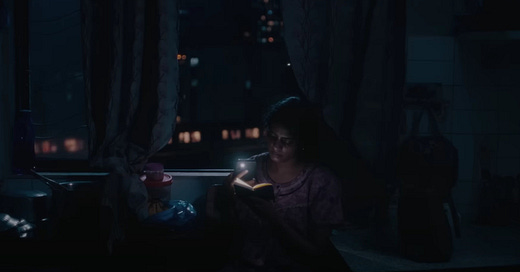Imagination and light are fundamental elements of cinema and Payal Kapadia knows her way around both. In the wet alleyways of Bombai, amidst the faraway lights of the metro and the close up possibility of demolition, Kapadia’s women characters fill the screen with the fullness of their aspirations. Quiet aspirations. A middle-aged woman living in the shadow of her husband’s desertion. A younger woman transgressing social boundaries to experiment with love. An older woman facing eviction with matter of factness. Three women, the rainy city of illusions, and a piano soundtrack come alive in this masterpiece.
Interiority is excavated in this film under the cover of darkness. In her small apartment in Mumbai, in the late hours consecrated for sleeping, Prabha embraces a rice cooker received as a gift from an unknown sender but which reminds her of her husband. In the dark caves of Ratnagiri, Anu tells her secret boyfriend that the future is here but she’s afraid of it, afraid of seizing life on her own terms. Beneath Mumbai’s streetlights, Parvaty picks up a stone and tears apart the vanity of class privilege that thrives on the displacement of those on whom it depends. Darkness is where the film’s characters imagine the possibility of light.
Silence and sound intersect to project this interiority onto the world at large. The film is filled with the sound of the surround—the local trains and bustling crowds of Mumbai, the festivity and madness of Ganpati, the crashing waves on the shores of Ratnagiri. The characters—silent for long periods of time—move through the world in mundane existence: cooking, eating, humming, smiling, staring, holding on to the handrails of the local train as if holding on to the illusion that is the city. In the background, a somber, yet playful sound-track.
Bodies in their sheer bare physicality hold the film. The dark, sweaty, unfiltered face of Prabha. The desiring, pulsating body of Anu. The intoxicated dance moves of Parvaty. Around them, bodily desires and personhoods of others. The doctor who wants Prabha to tell him to stay back for her, the returned-from-dead man who becomes her husband in a fit of imagination and kisses her hands one last time. Shiaz with his naked and vulnerable manhood, yearning for Anu. The young boy at the beach wearing earphones, moving his body in sonic rhythms, unconcerned by the world around.
In this play of darkness and light, sound and silence, bodies and intensities, Kapadia leaves traces—only traces, never full presence—of love, desire, pain, belonging, distance and longing, of fear and adventure and a profound, relentless, at once ordinary and extraordinary humanity. Without a cry or crescendo, special effects or dramatic monologues, but simply with an even, playful pace and a handful of characters, Kapadia weaves magic on the screen.
Images from Official Trailer, LUXBOX, YouTube.





